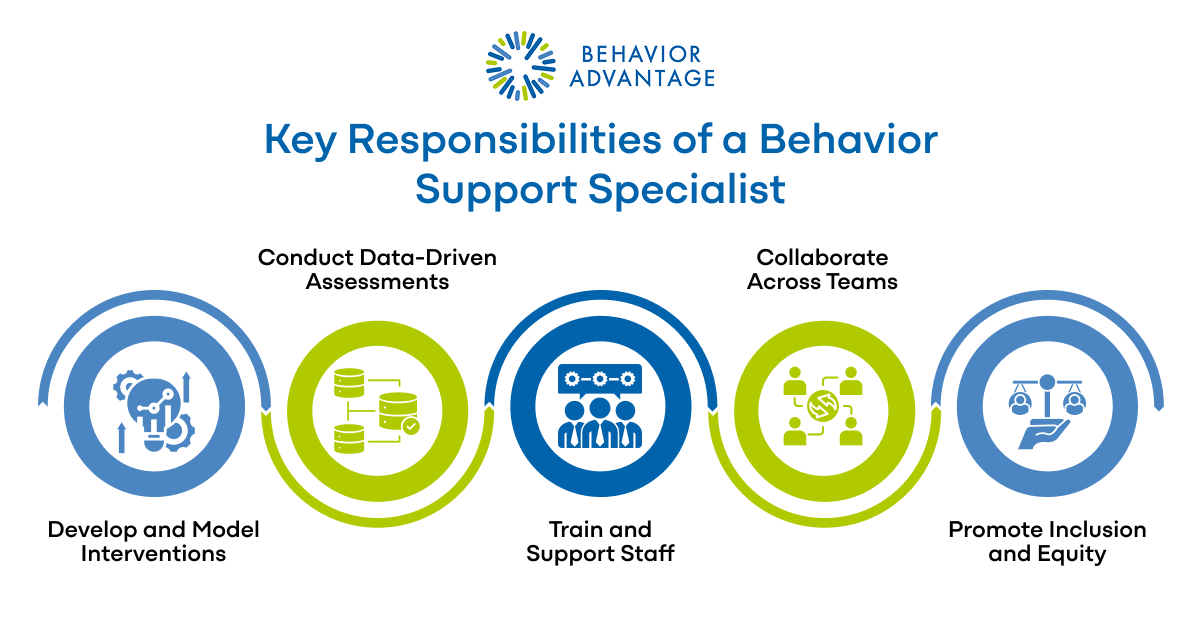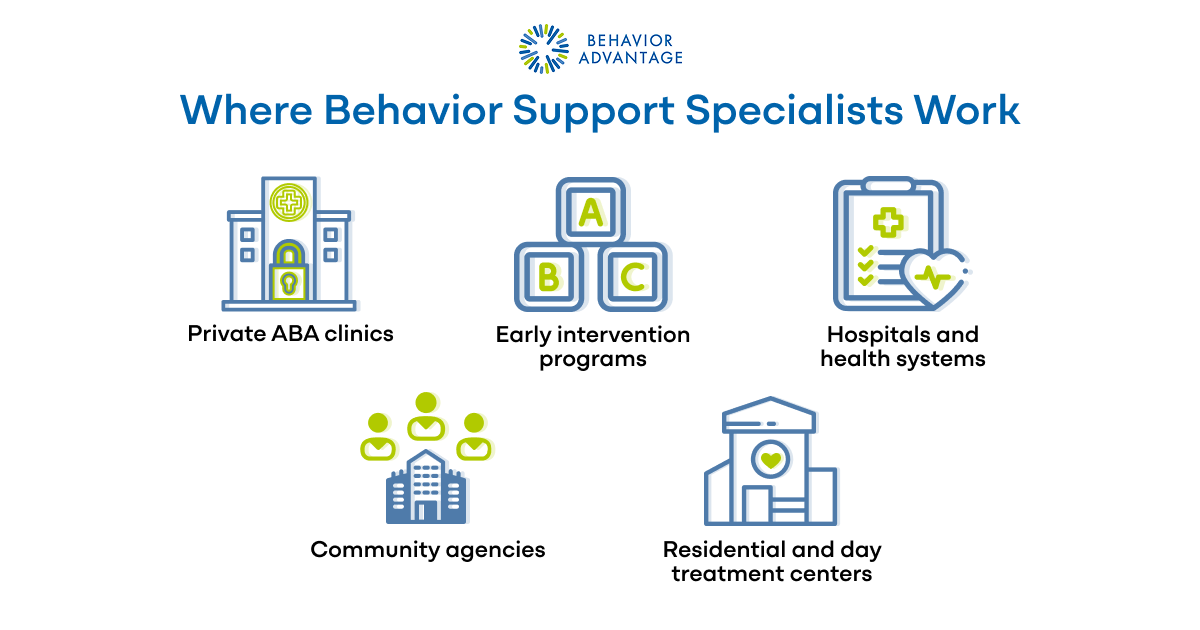Behavior support specialists—who are often Board Certified Behavior Analysts (BCBAs)—play a crucial role in schools, clinics, and care settings. They help students and individuals develop positive behaviors and reduce challenging ones using evidence-based practices grounded in Applied Behavior Analysis (ABA). In a time when social-emotional needs are more visible than ever, behavior support specialists serve as a bridge between clinical insight and classroom implementation.
Key Responsibilities of a Behavior Support Specialist
Behavior support specialists wear many hats. Their central mission is to promote and sustain positive behavior change by partnering with educators, administrators, caregivers, and support teams. Some of their core responsibilities include:
- Developing and Modeling Interventions: Behavior Support Specialists guide educators and caregivers through research-based strategies like Functional Behavior Assessments (FBA) and Positive Behavior Support Plans (PBSP). They don’t just write plans—they model, coach, and support the plans to bring them to life.
- Conducting Data-Driven Assessments: Using observations, data analysis, and behavioral tools, behavior support specialists identify the “why” behind challenging behavior and design function-based strategies to promote long-term improvement.
- Training and Supporting Staff: Through workshops, modeling, and hands-on coaching, they build staff capacity to respond proactively and consistently to behavior across settings.
- Collaborating Across Teams: These professionals work closely with educators, mental health providers, related service providers, and families to align behavior plans with academic and developmental goals.
- Promoting Inclusion and Equity: Today’s behavior support roles often call for a culturally responsive, trauma-informed lens—recognizing and addressing the diverse backgrounds and needs of students and clients.

How Behavior Support Specialists Support IDEA
Behavior support specialists play a vital role in helping schools meet their legal obligations under the Individuals with Disabilities Education Act (IDEA). When a student’s behavior interferes with learning, IDEA requires the IEP team to consider the use of positive behavioral interventions and supports to address those needs, as outlined in Section 34 of IDEA.
This is where Functional Behavior Assessments (FBAs) and Behavior Intervention Plans (BIPs) come in. These tools not only help improve behavior—they are essential to ensuring students receive a Free Appropriate Public Education (FAPE) in the Least Restrictive Environment (LRE).
- Support Access to FAPE: FBAs identify the function of a behavior—why it’s happening—while BIPs outline strategies to teach replacement behaviors and provide proactive supports. These tools help ensure that students aren’t excluded from learning opportunities because of behavior tied to their disability.
- Promote Inclusion: Effective behavior plans help students succeed in general education settings, reducing the need for exclusions, removals, or restrictive placements.
- Guide IEP Development with Data: FBAs offer data that informs measurable IEP goals, intervention strategies, and ongoing progress monitoring. This aligns with IDEA’s requirement for individualized, data-driven supports.This IEP goal bank resource can support your team in the IEP goal writing process!
- Inform Disciplinary Actions: If a student with an IEP is removed from school for more than 10 consecutive school days, IDEA requires a manifestation determination review (MDR) to determine if the behavior is a result of the student’s disability. An existing FBA and BIP can provide essential documentation and context to ensure equitable outcomes.
- Emphasize Positive, Preventive Approaches: FBAs and BIPs align with IDEA’s preference for constructive, educational responses over punishment—building skills instead of relying on consequences.
In short, FBAs and BIPs are not only best practices—they are essential legal tools that ensure schools address behavior with equity, empathy, and effectiveness. These free FBA and BIP templates can support you in meeting your legal requirements under IDEA.
In addition to their training and technical expertise, behavior support specialists rely on strong interpersonal skills to collaborate effectively and build trust as part of a school team.
Skills and Qualities That Make a Behavior Support Specialist Effective
Behavior support specialists combine deep behavioral knowledge with a people-first mindset. Their role isn’t just about following protocols—it’s about responsive problem-solving, building trust, and supporting lasting change.
Key strengths that contribute to success in the role include:
- Analytical Insight: The ability to interpret behavior patterns, make sense of complex situations, and use data to guide individualized interventions.
- Innovation: Bringing fresh ideas and adaptable strategies to meet the diverse and shifting needs of students or clients.
- Emotional Regulation: Staying grounded and composed during challenging moments, and modeling calm, supportive responses in high-stress environments.
- Team-Oriented Mindset: Working side by side with educators, caregivers, and specialists to align approaches and ensure consistency across environments.
- Continuous Improvement: Seeking out new learning, applying feedback, and refining practices to better serve those receiving support.
Educational Pathways and Certifications
Becoming a behavior support specialist requires a blend of education, fieldwork, and certification. Entry-level roles like Registered Behavior Technician (RBT) may require only a high school diploma and training, while more advanced positions require graduate-level education and board certification:
- Board Certified Behavior Analyst (BCBA): Requires a master’s degree in Applied Behavior Analysis, Psychology, Special Education, or a related field, plus supervised fieldwork and a passing score on the BCBA exam.
- Board Certified Assistant Behavior Analyst (BCaBA): Requires a bachelor’s degree, supervised experience, and a passing exam score.
- Registered Behavior Technician (RBT): A paraprofessional certification that includes training and ongoing supervision by a BCBA.
- State Licensure: Many states require behavior analysts to hold a state license, often in addition to national certification.
Valuing Diverse Pathways to Expertise
While credentials like BCBA or RBT are often emphasized in hiring, many professionals bring valuable experience to behavior support roles—even without formal certifications. It’s important to recognize the strengths that come from a variety of backgrounds:
- Seasoned educators and school psychologists often have years of hands-on experience managing classroom behavior, collaborating with teams, and supporting students with complex needs.
- Classroom experience builds credibility. Educators and administrators tend to trust those who understand the day-to-day challenges of teaching and learning.
- Relationships and trust drive behavior change. Certifications can enable assessments and billing, but long-term success often hinges on connection, communication, and a collaborative mindset.
- Lived experience matters. Professionals who’ve “walked the walk” are often best positioned to offer practical, responsive strategies that work in real-time settings.
In school-based behavior support, the strongest teams often include a mix of certified specialists and experienced educators working together toward shared goals. Special education teachers, in particular, often bring valuable experience in writing and implementing behavior intervention plans, conducting informal assessments, and delivering consistent support within the classroom—making them essential partners in effective, collaborative behavior planning.
Where Behavior Support Specialists Work
Though many work in schools, behavior support specialists are also found in:

No matter the setting, the focus remains the same: improving quality of life by teaching new skills and reducing behaviors that interfere with learning and independence.
Starting Your Career in Behavior Support
Behavior support is a growing field with many entry points—whether you’re just starting out or planning a long-term career as a certified behavior analyst. Here’s how to begin:
Explore Entry-Level Roles
You don’t need an advanced degree to get started. Positions like Registered Behavior Technician (RBT), Behavior Technician, Direct Support Professional (DSP), or clinic assistant provide hands-on experience supporting individuals with behavioral needs. These roles are often available to candidates with a high school diploma or some college coursework.
Gain Experience
Working in schools, clinics, or residential programs gives you valuable exposure to behavior support strategies, data collection, and teamwork. Many people use these roles as a stepping stone toward advanced credentials.
Earn a Degree
If you’re aiming to become a Board Certified Behavior Analyst (BCBA), start with a bachelor’s degree in psychology, education, human services, or a related field. A master’s degree in Applied Behavior Analysis (ABA) or a closely aligned area is typically required for BCBA certification.
Pursue Certification
Depending on your career goals, you may pursue:
- RBT (Registered Behavior Technician): Requires training, a competency assessment, and ongoing supervision.
- BCaBA (Board Certified Assistant Behavior Analyst): Requires a bachelor’s degree and supervised fieldwork.
- BCBA (Board Certified Behavior Analyst): Requires a graduate degree, fieldwork, and passing the BCBA exam.
Understand State Requirements
Licensing requirements vary by state. Some states require additional credentials, background checks, or continuing education. Always review your state’s licensing board for up-to-date information
Search Strategically
Use job boards with filters for certification level, setting (school, clinic, home-based), and schedule (full-time, part-time, hybrid). Look for organizations that prioritize inclusion, mentorship, and opportunities for professional growth.
Whether you’re entering the field as a technician or pursuing advanced certification, there are many paths to making a meaningful impact in behavior support.
A Career That Makes a Difference
Behavior support specialists are true change agents. Whether they’re training teams, improving school-wide systems, or supporting a single student through a tough moment, their work leaves a lasting impact. Rooted in the science of behavior, many professionals in this field also excel at organizational leadership—applying principles from Organizational Behavior Management (OBM) to strengthen team collaboration, streamline processes, and drive meaningful change across entire schools or programs.
With the right mix of heart, data, and strategy, this career offers not only professional fulfillment but also the opportunity to influence systems, empower staff, and make a difference—one behavior plan, one team, and one learner at a time.
Ready to Strengthen Your Behavior Support Team?
Whether you’re hiring a behavior support specialist, exploring certification paths, or building out behavior plans that align with IDEA, the right tools and people make all the difference.
Looking for resources to support behavior planning, data collection, and team collaboration?
Let us help you streamline the process with practical, school-ready solutions.











